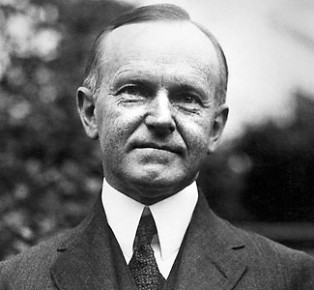The moment that President Coolidge announced: “I do not choose to run for President in nineteen twenty-eight” August 2, 1927, the speculation began. Did he actually mean he would not seek another term of office? As the election drew near, Herbert Hoover continued to try without success to extract an answer he could consider definitive from the man who would be his predecessor. No plans for the future were announced and yet by the summer of 1930 it became clear for most that Mr. Coolidge did mean what he said about retirement from public life. He left and never looked back. “Draft Coolidge” movements would crop up in 1928 and again in 1932 but he was not going to return. Period. He was not a man so nurtured on his popularity that he felt compelled to say something other than what he meant or to build a legacy around himself. He also knew that results are worth more than intentions, however lofty and well-meaning they might be. He practiced this principle all his life. He won every election he ever sought save one defeat in 1905. However, his strength as a candidate did not come through ingratiating himself upon others. A biographer recounts one of Frank Stearns’ early recollections of Coolidge’s leadership of the Massachusetts Senate. Stearns was permanently struck by watching Coolidge at work, as the “entire absence of effort to impress me was different from the action of any politician that I had ever met”…and Mr. Stearns was a very well-connected man (“Calvin Coolidge: The Man From Vermont” by Claude M. Fuess, p. 130). Scholar John E. Haynes, having examined Coolidge’s Papers, has commented on the utter absence of lengthy explanations for presidential decisions, expansive journal entries or letters revealing why Coolidge did this or that (“The Calvin Coolidge Papers at the Library of Congress” in “The Real Calvin Coolidge,” vol. 8, Plymouth: CC Memorial Foundation, 1990, pp. 17-26). Make no mistake, there were plenty of problems that arose between 1923-1929. Any one of them would have merited Coolidge’s further exposition. What Coolidge intended to do was irrelevant to him let alone beneficial to posterity. He bequeathed the results of his actions not what he wished would have happened. Results are what should matter, he believed. When R. H. Waldo approached Mr. Coolidge about writing articles for the McClure Syndicate, it would take him two years of persistent effort to gain the former President’s consent on the project. Behind the emphasis on results, there rested an attitude of humility toward his role as a President. He was simply living up to a value of substance over appearance. He refused throughout his writing to become a kind of Promisor offering to save the country. He was not so vain to believe he could. But even more so, it was not the place of government leaders, past or present, to attempt to insulate the people from the consequences of their own choices. This act of refraining is what he called the “price of freedom.” Not only does paternalism fail when tried, it strips the rewards from opportunity in the name of security. It betrays the design of America. Michael Kochin, in his book on rhetoric, cites the thirtieth president as declaring: “The country cannot be run on the promise of what it will do for the people. The only motive to which they will continue ready to respond is the opportunity to do something for themselves, to achieve their own greatness, to work out their destiny” (“Five Chapters on Rhetoric” p.62). Mr. Coolidge understood that sound leadership lay in results not along the treacherous shoals of good intentions and soaring promises.
“The government cannot be run successfully by substituting the power of entertainment for the power of accomplishment. The essential quality for the voters to require in their choice of candidates is capacity for public service” — CC, October 8, 1930.
